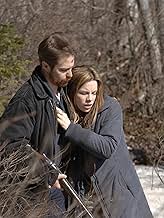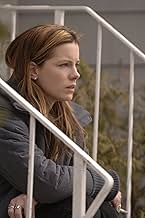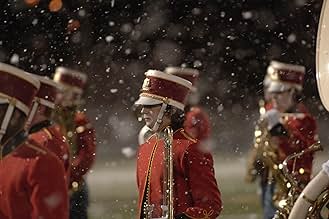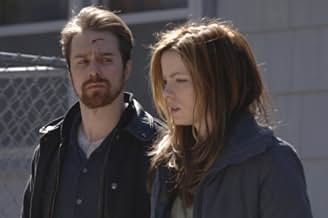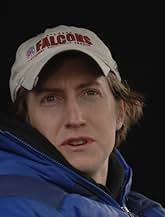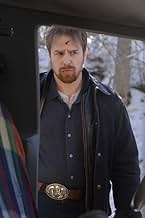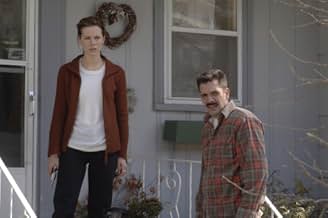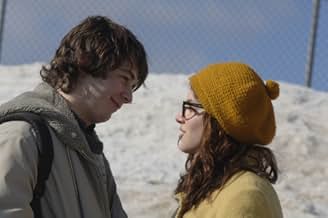A drama that interweaves the life of a teenager, with his old baby sitter, her estranged husband, and their daughter.A drama that interweaves the life of a teenager, with his old baby sitter, her estranged husband, and their daughter.A drama that interweaves the life of a teenager, with his old baby sitter, her estranged husband, and their daughter.
- Director
- Writers
- Stars
- Awards
- 1 win & 4 nominations total
Gracie Hudson
- Tara Marchand
- (as Grace Hudson)
Slavko Negulic
- Oskar
- (as Slavico Negulic)
- Director
- Writers
- All cast & crew
- Production, box office & more at IMDbPro
Featured reviews
For my short review, I'll start by saying that the movie is extremely well done by folks behind and in front of camera, but is not for the faint of heart.
But if you're easily depressed, this is not the film for you.
If you are okay with a very well done slice-of-life tragedy, you may appreciate this story.
For me, it was more than I bargained for, and is unfortunately sticking in my head.
But if you're easily depressed, this is not the film for you.
If you are okay with a very well done slice-of-life tragedy, you may appreciate this story.
For me, it was more than I bargained for, and is unfortunately sticking in my head.
The underlying novel and this film stole my planned novel! I live in Northeast Pennsylvania (the film is set in Southwest PA). I'm one of those who threaten, promise, etc., to write a book someday but probably never will. But my main idea was to write about one of the ancient defunct communities that dot the old coal and oil regions of the state.
SNOW ANGELS does a great job at depicting lives in such communities. Especially during that part of the year when the landscape is barren and suicides spike. The profound sense of hopelessness is evident in many of the characters. Those without resources fall into profound despair. Those better off look into themselves. The result is always tragic or counter-productive. Only youth sees promise, has hope, etc.
The film was far from perfect: Rockwell and Beckinsale's story line so dominates that the lives of the other characters become almost a distraction. I doubt that's what the author intended. The climax pays off in intensity but is predictable. But the acting and script are exceptional as is the pacing and mood. For those who think the film lacks plot, the simple depiction of setting and life are story enough.
SNOW ANGELS does a great job at depicting lives in such communities. Especially during that part of the year when the landscape is barren and suicides spike. The profound sense of hopelessness is evident in many of the characters. Those without resources fall into profound despair. Those better off look into themselves. The result is always tragic or counter-productive. Only youth sees promise, has hope, etc.
The film was far from perfect: Rockwell and Beckinsale's story line so dominates that the lives of the other characters become almost a distraction. I doubt that's what the author intended. The climax pays off in intensity but is predictable. But the acting and script are exceptional as is the pacing and mood. For those who think the film lacks plot, the simple depiction of setting and life are story enough.
Snow Angels is set in a small town in America during a non-specific time. There are few details that define or accentuate time and place. It could be any small town, USA, and for all we know, it could be the present. All we really know is that it is cold and wintertime. Directed by David Gordon Green, Snow Angels is a somber, affecting meditation on sadness and fate, based on the novel written by Stewart O'Nan. It chronicles two weeks in the life of the central characters, whose lives are all connected in some way.
The movie begins with striking images of winter, barren trees and snow. A high school marching band is rehearsing outdoors for the football game. They are lethargic and out of tune. Their instructor chides them, and we here the sound of what might be gunshots in the distance. Everything stops and the story goes back to two weeks prior, where the characters are introduced. We see Arthur (Michael Angarano) the high school student busing tables in a Chinese restaurant. He works with his older friend Annie, played by Kate Beckinsale, the newly separated mother who used to baby-sit for Michael when he was young. Annie gives Arthur a ride home when his mother forgets to pick him up. Arthur's parents, played by Jeanette Arnette and Griffin Dunne, are also going through a separation.
Later we meet Annie's estranged husband Glen, played by Sam Rockwell. Early on we learn that he has had problems with drinking and keeping a job and even tried to take his own life as a result of his life apart from Annie and the baby. Somehow, he survived the suicide and has become a born again Christian, but his stability remains uncertain. We also meet the new student Lila, played by Olivia Thirlby, who befriends Arthur. Lila is the outsider who takes photographs as a hobby. She is on the outside literally peering in, like the audience. Early on, she shows Arthur her photographs of the town. Since her family moves around a lot, she likes to take pictures of her first impressions of the new places she moves to. They are beautiful portraits, all black and white, mostly of them empty landscapes and snow. Coldness and alienation is a constant theme that wraps around the characters to a nearly suffocating extent.
Green's direction is deliberate and slowly paced. The camera rests patiently upon the characters, giving them time to grow and breathe. Even in awkward moments, as there are in the life of a teenager, and in the tension rising moments of the adults who are enduring emotional pain, the shots are long and deliberate, with a quiet, gentle soundtrack that does not try to manipulate or force the action. Green allows the dialog and the performances of the actors drive the story. There is no melodrama, just painfully sad realities.
Snow Angels has the feel of an independent film in its simple story-telling and without bloated production values or faux sentimentality or gimmicky performances. It feels like real life, real people in a real town. The only problem is that it's real, real sad. In fact, it's too sad. Despite the artful direction and nuanced performances, the film itself has little balance, nothing to contrast the heavy weight of angst that smothers the characters as well as the audience. Fargo, (1996), was a similar movie a tragic tale of human failings, set in a vast, winter of emptiness. And yet, there were many contrasting elements which balanced the mood, such as hilarious dialog and mannerisms, a riveting, driving musical score and shocking, unexpected violence. Many aspects of that film were recognized for achievement in film-making and I believe it even received Best Picture at the Academy Awards. I would also dare say that this movie energized the careers of several of its little known actors and deservedly so, including Steve Buscemi, William H. Macy and Frances McDormand. But Snow Angels provides no such relief from its oppressive tone. I get the feeling that Sam Rockwell and Kate Beckinsale needed an immediate retreat to a warm, tropic island after making this picture, (or at least a few sessions of therapy), and through no fault of their own. Their performances are great, but the movie, over all, leaves you with the need for immediate cleansing or escape, to anywhere that's warm.
The movie begins with striking images of winter, barren trees and snow. A high school marching band is rehearsing outdoors for the football game. They are lethargic and out of tune. Their instructor chides them, and we here the sound of what might be gunshots in the distance. Everything stops and the story goes back to two weeks prior, where the characters are introduced. We see Arthur (Michael Angarano) the high school student busing tables in a Chinese restaurant. He works with his older friend Annie, played by Kate Beckinsale, the newly separated mother who used to baby-sit for Michael when he was young. Annie gives Arthur a ride home when his mother forgets to pick him up. Arthur's parents, played by Jeanette Arnette and Griffin Dunne, are also going through a separation.
Later we meet Annie's estranged husband Glen, played by Sam Rockwell. Early on we learn that he has had problems with drinking and keeping a job and even tried to take his own life as a result of his life apart from Annie and the baby. Somehow, he survived the suicide and has become a born again Christian, but his stability remains uncertain. We also meet the new student Lila, played by Olivia Thirlby, who befriends Arthur. Lila is the outsider who takes photographs as a hobby. She is on the outside literally peering in, like the audience. Early on, she shows Arthur her photographs of the town. Since her family moves around a lot, she likes to take pictures of her first impressions of the new places she moves to. They are beautiful portraits, all black and white, mostly of them empty landscapes and snow. Coldness and alienation is a constant theme that wraps around the characters to a nearly suffocating extent.
Green's direction is deliberate and slowly paced. The camera rests patiently upon the characters, giving them time to grow and breathe. Even in awkward moments, as there are in the life of a teenager, and in the tension rising moments of the adults who are enduring emotional pain, the shots are long and deliberate, with a quiet, gentle soundtrack that does not try to manipulate or force the action. Green allows the dialog and the performances of the actors drive the story. There is no melodrama, just painfully sad realities.
Snow Angels has the feel of an independent film in its simple story-telling and without bloated production values or faux sentimentality or gimmicky performances. It feels like real life, real people in a real town. The only problem is that it's real, real sad. In fact, it's too sad. Despite the artful direction and nuanced performances, the film itself has little balance, nothing to contrast the heavy weight of angst that smothers the characters as well as the audience. Fargo, (1996), was a similar movie a tragic tale of human failings, set in a vast, winter of emptiness. And yet, there were many contrasting elements which balanced the mood, such as hilarious dialog and mannerisms, a riveting, driving musical score and shocking, unexpected violence. Many aspects of that film were recognized for achievement in film-making and I believe it even received Best Picture at the Academy Awards. I would also dare say that this movie energized the careers of several of its little known actors and deservedly so, including Steve Buscemi, William H. Macy and Frances McDormand. But Snow Angels provides no such relief from its oppressive tone. I get the feeling that Sam Rockwell and Kate Beckinsale needed an immediate retreat to a warm, tropic island after making this picture, (or at least a few sessions of therapy), and through no fault of their own. Their performances are great, but the movie, over all, leaves you with the need for immediate cleansing or escape, to anywhere that's warm.
"Snow Angels" is a glimpse in time of several relationships, some simmering and ready to boil, others cooling down, and at least one whose flame has yet to be lit. It's also a thriller, with a gunshot that is heard as the film opens. The narrative is linear but writer/director David Gordon Green, adapting the novel by Stewart O'Nan, takes the couples' stories and interweaves them in such a way that we never quite know all the secrets at the heart of the mystery. The film flashes back as we try to see how we got from there to here. In many ways the overriding theme deals with the promise of what once was versus the reality of what could have been. The "reality" is embodied in the relationships which are falling apart, as evident in the older couples. The "promise" is represented by the young couple whose lives are just beginning.
At the heart of the film is the crumbling relationship between Sam Rockwell as Glenn and Kate Beckinsale as Annie. We watch Glenn almost literally disintegrating before our eyes as he tries to get a grip on who he is and why his marriage is failing. Glenn is one of the most frightening characters I've seen outside of horror films. Kate Beckinsale's Annie is breathtaking, in every sense of the word. We bear witness to a life in free fall as everything and everyone she loves seems just out of reach. You know those dreams where you can't quite get to where you want? You try to touch it but it stays at arm's length? That's Annie's world. We so painfully watch as the madness around her takes its toll, and she weathers the way rain erodes rich topsoil, leaving little but rocky dirt underneath. Amy Sedaris is Annie's best friend Barb. She has her own marital fires to put out, and the relationship between Annie and Barb progresses in a way nobody can imagine. She is a joy to watch. In the midst of the darkness there are some lighter moments as well, and Michael Angarano (Arthur Parkinson), Olivia Thirlby (Lila Raybern), and Connor Paolo (Warren) have the lion's share of them. They are essentially the light in the darkness that surrounds the rest of the film. It should be no surprise to fans of Angarano that writer/director David Gordon Green would have chosen him to play Arthur Parkinson. He's not yet comfortable in his own skin, a trait which could describe most adolescents. He's a bit shy, nervous, and even nerdy, yet he is charming enough that everyone else seems drawn to him even though he doesn't seem to be aware of it. As Arthur's muse, Olivia Thirlby's Lila is the female representation of those awkward teenage years and an almost equal counterpart to Michael's Arthur. Their tender tiptoeing around each other is one of the most touching depictions of first love I've seen in cinema. Connor, as Arthur's best friend Warren, provides some much needed comic relief. He is a smart-ass whose ego often backfires. He's funny and not quite as smart as he thinks he is. Among other standout performances is Griffin Dunne (Don) as Arthur's flighty dad. Or should we say father, not really the "Dad" that Arthur wants or needs him to be, but the boy clings to him in this critical time of life when he is most in need of a male role model. But he won't find one here. It's this failure to connect which climaxes in an exchange between them that gave me chills. It was a jaw-dropping moment.
So much of the film is frightening that, as Green said in the Q&A afterward, he had to find actors who could infuse some humor into their characters, otherwise it would be too heavy. All around me were glistening eyes and tissues wiping away tears. At its heart it is a sad story and the audience was hushed at the end. Many have wondered how much of the film is David Gordon Green's adaptation as opposed to the Stewart O'Nan novel on which it is based. Green did discuss this at length in the Q&A. After reading the book, he knew he had to make it into a film. But he also immediately knew that it would have to be heavily adapted. The more he wrote the more he realized just how much would really have to come from his own hand. The impression I got was that what we see on screen is much more David's work than maybe even he had initially anticipated.
Jeff McIlwain and David Wingo's score is haunting, as is the film. It is used sparsely, only to punctuate the dramatic moments, as the subject matter is weighty enough that it didn't need much augmentation. It's used efficiently and effectively. The film is visually stunning. No surprise here, as it was shot by Green's longtime collaborator Tim Orr. His work is unmistakable -- gutters dripping, swings on a swing set, clouds, contrails, aluminum siding -- you can always tell his work. He sees language in shapes and movement of inanimate objects. He then connects them to the action in the story, often with a wink and a nod. Blink and you might miss it. The beautiful winter landscape of Nova Scotia gives him a palette from which he can choose many colors. The juxtaposition of Orr's beautiful photography with the horrors David Gordon Green exposes us to in "Snow Angels" is nothing short of genius.
This is a true work of art, to which many filmmakers aspire. Few hit the mark. I'm not sure if that's what David Gordon Green was trying to do here, but he did it nonetheless. There is little doubt in my mind that this is a film which will make you think about the innocence of youth and how fleeting it is, and make you wonder if it has to be that way.
At the heart of the film is the crumbling relationship between Sam Rockwell as Glenn and Kate Beckinsale as Annie. We watch Glenn almost literally disintegrating before our eyes as he tries to get a grip on who he is and why his marriage is failing. Glenn is one of the most frightening characters I've seen outside of horror films. Kate Beckinsale's Annie is breathtaking, in every sense of the word. We bear witness to a life in free fall as everything and everyone she loves seems just out of reach. You know those dreams where you can't quite get to where you want? You try to touch it but it stays at arm's length? That's Annie's world. We so painfully watch as the madness around her takes its toll, and she weathers the way rain erodes rich topsoil, leaving little but rocky dirt underneath. Amy Sedaris is Annie's best friend Barb. She has her own marital fires to put out, and the relationship between Annie and Barb progresses in a way nobody can imagine. She is a joy to watch. In the midst of the darkness there are some lighter moments as well, and Michael Angarano (Arthur Parkinson), Olivia Thirlby (Lila Raybern), and Connor Paolo (Warren) have the lion's share of them. They are essentially the light in the darkness that surrounds the rest of the film. It should be no surprise to fans of Angarano that writer/director David Gordon Green would have chosen him to play Arthur Parkinson. He's not yet comfortable in his own skin, a trait which could describe most adolescents. He's a bit shy, nervous, and even nerdy, yet he is charming enough that everyone else seems drawn to him even though he doesn't seem to be aware of it. As Arthur's muse, Olivia Thirlby's Lila is the female representation of those awkward teenage years and an almost equal counterpart to Michael's Arthur. Their tender tiptoeing around each other is one of the most touching depictions of first love I've seen in cinema. Connor, as Arthur's best friend Warren, provides some much needed comic relief. He is a smart-ass whose ego often backfires. He's funny and not quite as smart as he thinks he is. Among other standout performances is Griffin Dunne (Don) as Arthur's flighty dad. Or should we say father, not really the "Dad" that Arthur wants or needs him to be, but the boy clings to him in this critical time of life when he is most in need of a male role model. But he won't find one here. It's this failure to connect which climaxes in an exchange between them that gave me chills. It was a jaw-dropping moment.
So much of the film is frightening that, as Green said in the Q&A afterward, he had to find actors who could infuse some humor into their characters, otherwise it would be too heavy. All around me were glistening eyes and tissues wiping away tears. At its heart it is a sad story and the audience was hushed at the end. Many have wondered how much of the film is David Gordon Green's adaptation as opposed to the Stewart O'Nan novel on which it is based. Green did discuss this at length in the Q&A. After reading the book, he knew he had to make it into a film. But he also immediately knew that it would have to be heavily adapted. The more he wrote the more he realized just how much would really have to come from his own hand. The impression I got was that what we see on screen is much more David's work than maybe even he had initially anticipated.
Jeff McIlwain and David Wingo's score is haunting, as is the film. It is used sparsely, only to punctuate the dramatic moments, as the subject matter is weighty enough that it didn't need much augmentation. It's used efficiently and effectively. The film is visually stunning. No surprise here, as it was shot by Green's longtime collaborator Tim Orr. His work is unmistakable -- gutters dripping, swings on a swing set, clouds, contrails, aluminum siding -- you can always tell his work. He sees language in shapes and movement of inanimate objects. He then connects them to the action in the story, often with a wink and a nod. Blink and you might miss it. The beautiful winter landscape of Nova Scotia gives him a palette from which he can choose many colors. The juxtaposition of Orr's beautiful photography with the horrors David Gordon Green exposes us to in "Snow Angels" is nothing short of genius.
This is a true work of art, to which many filmmakers aspire. Few hit the mark. I'm not sure if that's what David Gordon Green was trying to do here, but he did it nonetheless. There is little doubt in my mind that this is a film which will make you think about the innocence of youth and how fleeting it is, and make you wonder if it has to be that way.
"Snow Angels" starts off as a fairly conventional, angst-ridden indie drama about life in an American small town, but the movie turns into a profoundly moving work after an unexpected tragedy strikes the community.
Director David Gordon Green's screenplay (co-written by Stewart O'Nan) focuses on two disintegrating marriages - one belonging to Annie and Glen Marchand, and the other to Louise and Arthur Parkinson - and the effect the breakups are having on the children and extended families. The people in both groups already seem profoundly unhappy with their lives, but when an unspeakable disaster occurs, things go from bad to worse for all concerned.
"Snow Angels" features insightful writing, sensitive direction and a profound sense of place and season (it takes place in the deep, dark days of a Midwestern winter, though the film itself was filmed in Nova Scotia). It's not an easy movie to watch at times - its emotions wrenching and its characters' weaknesses all too human and recognizable – but excellent performances by Kate Beckinsale, Sam Rockwell, Michael Angarano, Jeanetta Arnette, Deborah Allen and Griffin Dunne, among others, make it worthwhile viewing.
Director David Gordon Green's screenplay (co-written by Stewart O'Nan) focuses on two disintegrating marriages - one belonging to Annie and Glen Marchand, and the other to Louise and Arthur Parkinson - and the effect the breakups are having on the children and extended families. The people in both groups already seem profoundly unhappy with their lives, but when an unspeakable disaster occurs, things go from bad to worse for all concerned.
"Snow Angels" features insightful writing, sensitive direction and a profound sense of place and season (it takes place in the deep, dark days of a Midwestern winter, though the film itself was filmed in Nova Scotia). It's not an easy movie to watch at times - its emotions wrenching and its characters' weaknesses all too human and recognizable – but excellent performances by Kate Beckinsale, Sam Rockwell, Michael Angarano, Jeanetta Arnette, Deborah Allen and Griffin Dunne, among others, make it worthwhile viewing.
Did you know
- TriviaSam Rockwell really did hit his head on the truck, and punch the tree. (reference an interview at vimeo.com/859232) Previously he had gotten tips from a stunt man on how to head-bang the truck without hurting himself too much. However, when he hit the tree with his knuckles, he did it for real, and hard. He visited the hospital in the evening.
- GoofsIn the scene where Arthur takes a swig from a bottle of beer hidden on the floor, he raises it with the label facing him. In the next cut scene, as he lowers the bottle, the label can be clearly seen facing the camera.
- Quotes
Louise Parkinson: You never know what fate has in store for you, sweetheart. It's funny how you can tell the fake smiles in pictures.
Arthur Parkinson: You notice people don't bring out cameras on sad days?
- SoundtracksSledgehammer
Written by Peter Gabriel
Published by Real World Music, Ltd. (PRS) for the World / Pentagon Lipservices Real World (BMI) Admin for USA & Canada
Courtesy of Real World Music, Ltd. and Lipservices Music Publishing
Performed by Atlantic Region Cadet Tri-Service Band
Details
- Release date
- Country of origin
- Official site
- Language
- Also known as
- Les anges de neige
- Filming locations
- Production companies
- See more company credits at IMDbPro
Box office
- Gross US & Canada
- $402,858
- Opening weekend US & Canada
- $14,247
- Mar 9, 2008
- Gross worldwide
- $414,404
- Runtime1 hour 47 minutes
- Color
- Sound mix
- Aspect ratio
- 2.35 : 1
Contribute to this page
Suggest an edit or add missing content







